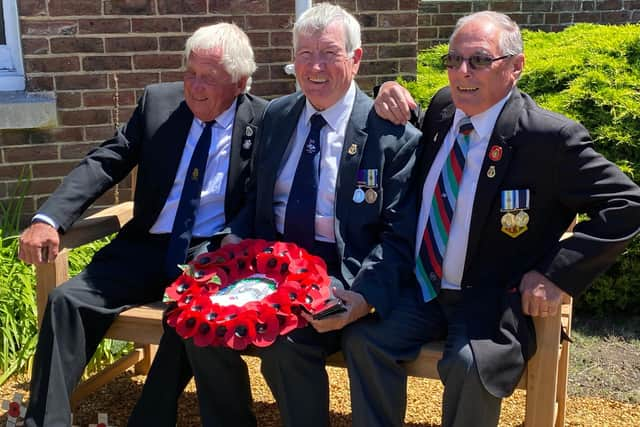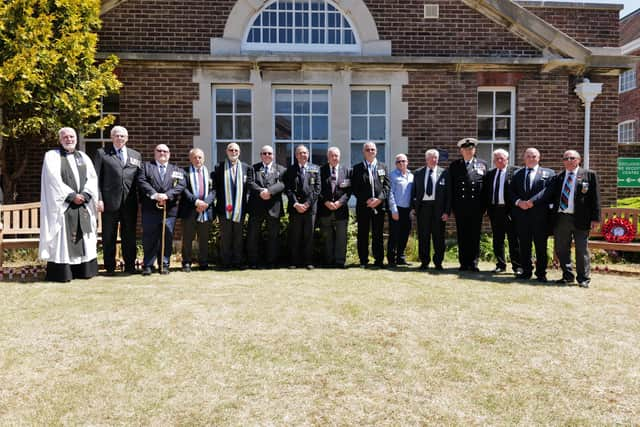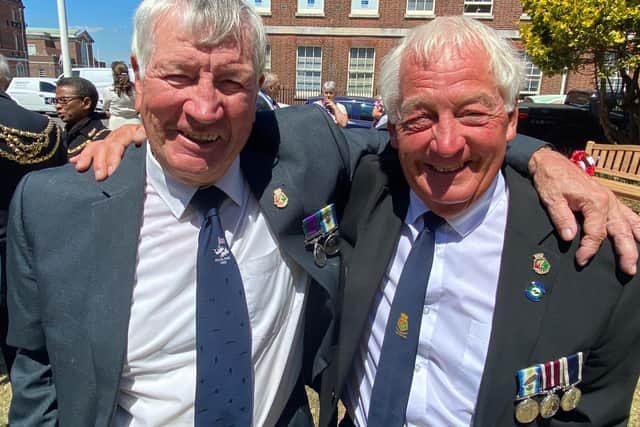Royal Navy: Portsmouth unveils new memorials to Falklands heroes killed in sinking of HMS Coventry and HMS Sheffield
and live on Freeview channel 276
Two new benches were unveiled to commemorate the sinking of destroyers HMS Coventry and HMS Sheffield – and remember the 39 men killed in the tragedies.
The memorials, funded by the Royal Naval Association (RNA) and Association Of Wrens, were unveiled in front of veterans, naval top brass and Portsmouth’s Lord Mayor, Councillor Hugh Mason.


Advertisement
Hide AdAdvertisement
Hide AdAmong those attending was Faz Fazackerley, who was a Chief Petty Officer on HMS Coventry when the ship was destroyed and was awarded the Queen’s Commendation for Bravery for his role in helping rescue injured shipmates.
The 73-year-old, of Stubbington, who later went back twice to the Falklands to construct the permanent memorial to Coventry on Pebble Island, said the conflict never left his thoughts.
‘The Falklands taught me how to cry,’ he said, holding back tears. ‘It was a hard time in the war and getting people out of the ship…it was incredibly hard.’
Friend and fellow Coventry survivor, Patrick Burke, of North End, welcomed the unveiling of the two commemorative benches at Portsmouth Naval Base.


Advertisement
Hide AdAdvertisement
Hide AdThe 77-year-old, who was a Petty Officer when Coventry was attacked, added: ‘Today’s been an absolutely wonderful experience. The church service was fantastic and all the names being read out, of the shipmates who did not survive, was wonderful and tearful.’
Lieutenant Commander Andy Christie, operations manager with the RNA, served as a Leading Hand in HMS Glasgow during the war – which managed to survive the conflict.
The 65-year-old, of Lee-on-the-Solent, said: ‘The longer life goes on, the more I realise just how lucky and how much fate is involved in war.
‘We had bombs bouncing over us - one went straight through the middle of the ship and out the other side.’


Advertisement
Hide AdAdvertisement
Hide AdRetired Captain Bill Oliphant, chief executive of the RNA, said it was nice to support the veteran community and added: ‘The links between the Royal Navy and people of Portsmouth have been reaffirmed today because a lot of the sailors in the Sheffield and Coventry - the two ships that didn’t come back to their home port that summer – would have lived in Portsmouth.’
Comment Guidelines
National World encourages reader discussion on our stories. User feedback, insights and back-and-forth exchanges add a rich layer of context to reporting. Please review our Community Guidelines before commenting.
